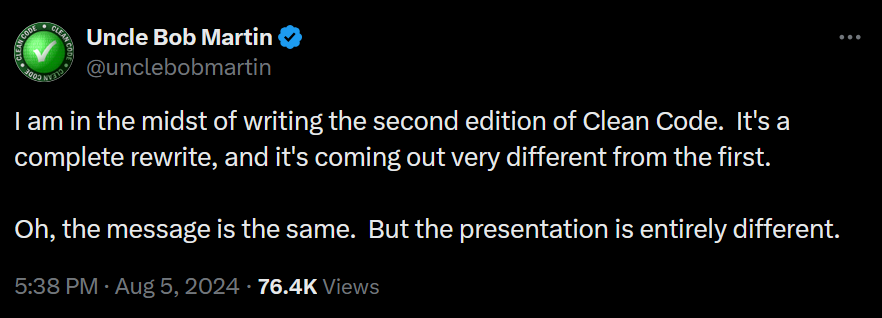this post was submitted on 10 Aug 2024
588 points (97.3% liked)
Programmer Humor
19564 readers
589 users here now
Welcome to Programmer Humor!
This is a place where you can post jokes, memes, humor, etc. related to programming!
For sharing awful code theres also Programming Horror.
Rules
- Keep content in english
- No advertisements
- Posts must be related to programming or programmer topics
founded 1 year ago
MODERATORS
you are viewing a single comment's thread
view the rest of the comments
view the rest of the comments

I genuinely think his book is rubbish. I agree with some of his points. Most of the good points are common sense. For the most part I heavily disagree with the book.
Throughout the book he has examples of programs where he shows before and after he applies “clean code”, and in almost all examples it was better how it was before.
I can write a lot about why I don’t like his book. He doesn’t make many compelling arguments. It’s mostly based on what he feels is good. He often contradicts himself as well. If I remember correctly, he has a section about how side effects are bad. I agree with him on this part. Shortly after, he proudly shows an example of “clean” program - and it’s littered with awful side effects!
He also has this weird obsession of hiding the logic of the program. As a programmer, I want all relevant logic of a method to be neatly collected in one place - not scattered around deeply nested method calls.
I can go on and on. I hate this book with a passion.
Sorry, I still don't really get the hate.
I use what I learned from watching a talk by him on clean code and I had to learn some stuff. It might be "common sense" for experienced developers. But it certainly doesn't come naturally that "functions should do one thing" to first time coders. The thought processes of when the software was developed usually isn't the best way the code should be structured in the end. But that's usually how beginners code.
In most diciplines, experience in the field is what makes the knowledge of the field. You don't always have to be able to explain why good practice does what it does.
Also: I know of some examples, where he clearly explains his reasoning, e.g. why comments shouldn't explain how the code works. (Because they're not going to be updated, when the code will be)
Either you misrepresent him, or you get a hard nope from me. Staying on one layer of abstraction is most likely my most important principle of writing understandable and maintainable code.
I categorize this as one of the better points of the book.
I kinda disagree with him on this point. I wouldn’t necessarily limit to one thing, but I think functions should preferably be minimal.
Throughout his examples he’s also using ideas like how functions should only be 3 lines long, preferably have no arguments, and also no return values.
This style of coding leads to programs that are nightmarish to work with. The relevant code you’re looking for might be 10 layers deep of function calls, but you don’t know where. You’re just jumping between functions that does barely nothing until you find the thing you’re looking for, and then you need to figure out how everything is connected together.
I prefer when things are flatter. This generally leads to more maintainable code as it’s immediately obvious what the code is doing and how everything is connected.
I think his book is the equivalent of a cleaning guide where all the steps are just to sweep all the mess under the carpet. It looks cleaner, but it’s not clean.
also, the dependency inversion thing makes it so that not even the tooling can help you with that, to put the cherry on the cake